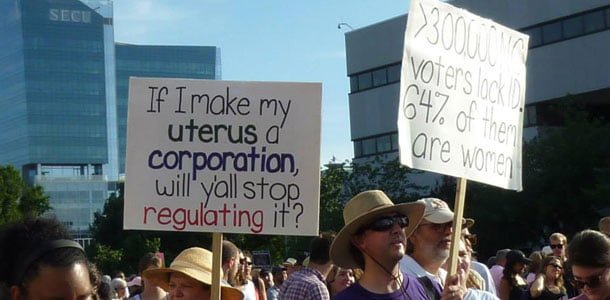
“Forward together, not one step back,” shouted the thousands of angry protesters outside of Raleigh’s General Assembly Building.
Over the summer, the Forward Together Movement, organized and led by Rev. Dr. William Barber II, protested the legislation passed by the Republican-swayed N.C. General Assembly.
The series of protests, called Moral Monday, brought people together in front of the legislative building to show their dissatisfaction with the bills.
Greensboro joined the fight on Aug. 28, sparking participation from almost 2,000 locals.
And the fight is not over yet. The movement continues to sweep across the state, with people gathering all over in hopes of bringing about change.
“It’s a reaction to the overreach of the Republican-controlled North Carolina legislature,” said Visiting Assistant Professor of Political Science Robert Duncan. “They’re undermining a lot of the headway that’s been made by minorities, the poor and women. It’s a way to turn back the clock.”
The people supporting the cause are of all different races, ages and ethnicities.
“Legislators in Raleigh don’t want to see multi-racial coalitions and other groups banding together,” said Joe Gamm of the News & Record.
While the protests stand united against the legislation, there are many different issues being raised.
“I don’t know where to start,” said Tim Leisman ‘13, who attended the Asheville protests. “It’s such a wide scope; so many policies and so much action. A lot of people consider them very extreme and very harmful to the condition of poor and working-class people, especially people of color.”
Women’s rights, taxes, education, healthcare and environmentalism are just some of the causes. One major legislative act that sparked protest concerned voting rights for college students.
“They restricted voters’ rights by making it so you have to have an in-state voter’s ID,” said first-year Davia Young, who attended the Raleigh protests. “That disqualifies everyone who goes to college out of state. Not all Guilford students are from North Carolina, so they wouldn’t be able to vote.”
If passed, this legislation would affect the voting rights of half the Guilford population.
The protests began in Raleigh, but have spread throughout the state in an effort to sway vacationing legislators. Many more districts and cities organized Moral Mondays and took to the streets — among them, the streets of Greensboro.
“The first Moral Monday was a rather small affair compared to what it turned into,” wrote Tanya Glover for the online editorial collection Truth-Out. “That first week bolstered the people of North Carolina, and in the weeks that followed, more and more people stepped up to be arrested, or ‘bear witness’ for justice.”
When the movement hit Asheville, a new division called Mountain Moral Monday began. For many, this was the highlight of the movement, as over 10,000 people showed their support.
“There was so much excitement, so much energy, so many people,” said Leisman.
“Ultimately the end goal is to get people to vote and to vote against policies that hurt lower-income and working-class people.”
Like Leisman, Duncan hopes that change will start in the poll booths.
“Hopefully in the next N.C. election, we’ll have candidates who truly represent the people, not just the wealthy,” he said.
While there have not been any organized protests since August, the movement is anything but silent.
“With growing attention on the protests, which themselves are expanding, organizers have repeatedly stated that their acts of resistance won’t cease any time soon,” wrote Eric Ginsburg for YES! Weekly.
Forward together, the protesters shouted. Not one step back.
[photomosaic nggid=152]